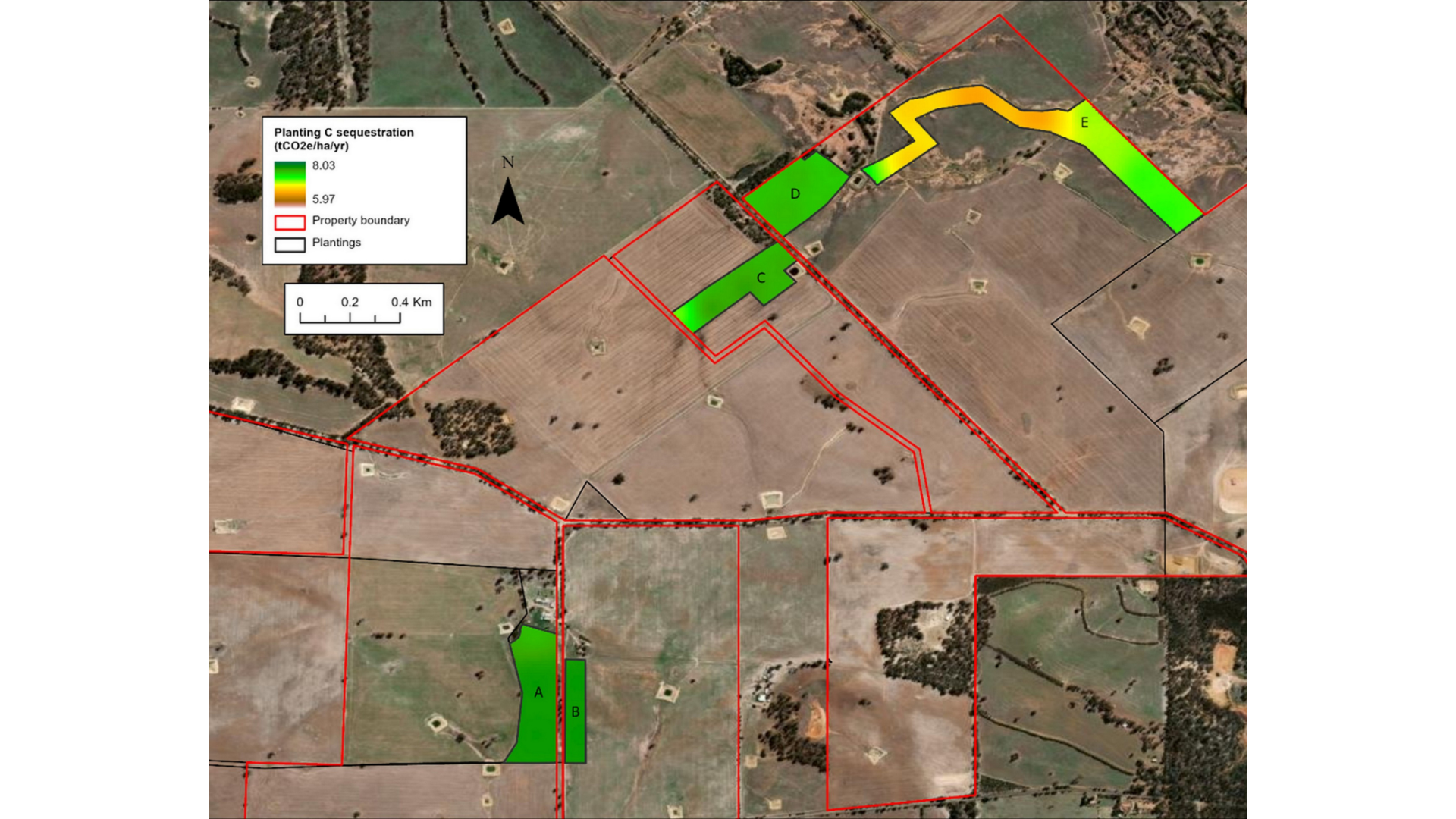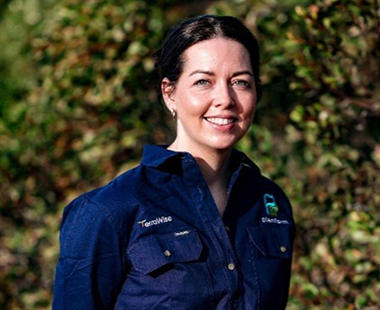Written by: Danielle Gale | TerraWise – Technical Manager | 0410 213 310
It’s about time that we published an update on some of the carbon-centric activities that TerraWise and Planfarm have been working on this year. We have been busy and have hit some impressive milestones, including 100,000 ha of land assessed for carbon farming potential between our various projects.
In this article, I’ll breeze through some concepts and terminology, so if you want some further background, have a read of the article I published in Landline last year. You can access that article here.
Voucher program completion
TerraWise, in conjunction with Planfarm, recently completed carbon farming feasibility assessments for voucher recipients of Round 1 of DPIRD’s Carbon for Farmers Voucher Program. A total of 67 successful applicants were assigned a voucher in this first round, with 21 of those applicants opting to engage the services of TerraWise and Planfarm. The Voucher Program provided funding to primary producers to engage a service provider to conduct a carbon farming project feasibility assessment of their business and develop a legislatively compliant project. The final output of this was a report (also called a “land management strategy”) outlining the proposed project attributes, design, implementation, and carbon sequestration potential.
Voucher recipients were able to explore and design a project under one of two approved Methods:
- Soil organic carbon sequestration project – these projects seek to store carbon in soil through various farming practices (i.e., those which retain or increase groundcover, reduce soil disturbance, alter soil composition). Australian carbon credit units (ACCUs) can then be earned for this stored carbon.
- Reforestation project via native plantings – these projects earn ACCUs by sequestering carbon dioxide from the atmosphere and storing it in native vegetation as it grows.
Project snapshot
Colloquially known as the “Voucher Project” in the Planfarm and TerraWise office, the carbon project feasibility assessments for all participants were conducted over a ten-month period. These participants were located across the Wheatbelt region, from Binnu in the north, to Merredin in the east, down to Esperance in the south. Out of the group, 16 opted to design a soil carbon project for their business, while the remaining 5 opted for a reforestation project.
In total, almost 50 different properties covering around 96,000 ha were assessed for carbon project potential. Once the eligibility of the land for a carbon project and future management had been taken into consideration, the final confirmed carbon project area totaled over 50,000 ha. We presented potential project ACCU earnings to clients in scenarios, from low sequestration potential to high potential.
Taking the average of these scenarios, all together the 21 proposed projects represent approximately 2.3 million ACCUs, equivalent to over $60 million* in potential ACCU revenue, for a 25-year project life.
Alongside carbon, each project was assessed for its potential to deliver co-benefits. When a carbon project is well-integrated in to a farming system, it can deliver wide-ranging productivity, environmental and social benefits beyond carbon. For the soil projects, the co-benefits we identified included improved farm resilience, soil health, erosion mitigation and regional employment opportunities. For native plantings projects, co-benefits included improved biodiversity, landscape connectivity, salinity and erosion mitigation. The integrity of carbon projects is increasingly under the microscope, as it should be, and the ongoing monitoring and reporting of project co-benefits is becoming more commonplace. In fact, ACCUs generated by projects with demonstrated co-benefits are often able to attain a price premium, in recognition of their high integrity and
impact.
At the end of the project, each client walked away with a report that clearly outlines their proposed carbon project. Each is now well-positioned to register and implement their project should they wish to proceed.
DPIRD has confirmed that there will be a Round 2 of the Voucher Program, to be announced this year. If you are interested in applying for a voucher in this upcoming round, please contact me (danielle@terrawise.au) and we can ensure that you are kept informed with any updates.
Alternatively, you can subscribe to DPIRD’s Low Carbon Futures news updates here.
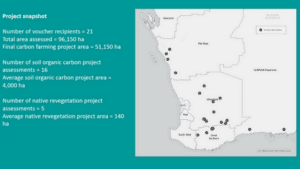
Key stages of a carbon project feasibility assessment
So, what does the carbon feasibility assessment and project design process look like? Roughly, we can break our process down in to five key steps:
Eligibility assessment
The very first step is a high level assessment of your business to determine your eligibility for a carbon project. Different project types have different requirements. For example, projects can’t be implemented on land that has been recently cleared, while eligible land management practices for a soil carbon project are determined by their type and when/if they were last implemented. Other factors such as rainfall and soil type will also influence eligibility. The eligibility assessment allows us to begin the process of working out which carbon project type best suits your business and where on your land it could be implemented.
Data collection
Arguably the most important step, we collect a wide range of data from you and other sources. On-farm data includes paddock boundaries, soil test results, yield and application data, management practices employed. Off-farm data includes weather data, satellite imagery and remote sensing information (i.e., NDVI, radiometrics, topography, vegetation coverage). The specific information collected will depend
on whether you are exploring a soil carbon or reforestation project.
It can seem daunting at first, but we can typically collect most of the on-farm information from other systems you may use (i.e., John Deere, Decipher, Summit, Agworld). No two businesses are the same, so we tailor our approach for each client. Going through this process also helps to set you up to meet the ongoing reporting requirements of a registered carbon project.
Property analysis
Now we can dive into the fun part! Using the data we have collected, we conduct a range of spatial analyses, potential carbon abatement assessments, ecological site assessments (for native plantings projects) and other analyses to assess your property(ies) for carbon farming potential and generate recommended project areas. We then sit with you and work through these together to identify a viable project that suits your needs. Afterall, while a project must be compliant and best position you to sequester carbon, however it must also align with your intended management of your land into the future.
Project design and carbon abatement
Once we have worked with you to confirm your project design, we will go away and draw up the final project and generate final projections around potential carbon abatement for your intended project. This looks very different for a soil carbon project to a reforestation project – but the goal is the same, a compliant project ready for registration!
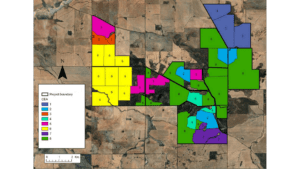
An example of a soil carbon project design. Paddocks of the same colour are grouped into the same carbon estimation area (CEA), which means that when soil carbon is measured, these areas are calculated together. Paddocks within CEAs have similar characteristics, from intended project activities to soil characteristics and previous management.
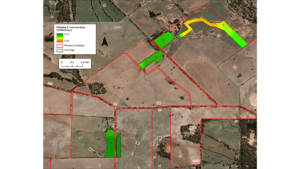
An example of a reforestation via environmental plantings project design. Darker green areas represent areas where the carbon sequestration rates of a planting are higher, yellow-to-orange shows lower sequestering areas. The variation within and between plantings is evident, and this is considered when finalizing project design.
Final report
The final stage is production of a report (land management strategy) that compiles all of the learnings gained so far. A land management strategy is a requirement of a soil carbon project but not of a reforestation project. Despite this, we produce these for both methods as it also serves as an invaluable resource as you go on to register, implement and manage your carbon project.
Whilst the specific content will differ depending on your project type, the reports typically include information on historical land use and management practices, proposed project activities, project mapping, protocols, costings,carbon abatement, risk mitigation and project co-benefits.
At every stage, we work closely with you. We take the time to answer any questions you may have, not just about your project but about the carbon market, farm emissions, carbon farming legislation. We want you to walk away with the ability to make informed decisions to best place your business.
What happens after you receive your report, you may ask? Well, if you decide to proceed with registering and implementing your project, TerraWise can walk you through different project funding models, can assist with project registration, coordination of project implementation and oversee the ongoing management and compliance of your project.
Are you interested in exploring the opportunities for carbon farming within your business? TerraWise can help you with this process. Reach out to us at danielle@terrawise.au or info@terrawise.au .
Other carbon news from Planfarm and TerraWise
- If you are an existing Planfarm client, you will have noticed that we collected extra information from you during the 2022 season review period. This information is being used to conduct Planfarm’s first round of
Carbon Benchmarking. This information will allow each client to obtain a high level report of their business’s emissions and to see how they compare across the Planfarm client base. - If you are interested in conducting a full carbon account of your business’s activities, TerraWise will be providing this service in the near future.
- How does this differ from the Carbon Benchmarking services provided by Planfarm? Well, the carbon account will adopt a very farm-specific approach to the assessment of your existing emissions profile, allowing you to tease out the contribution of different components of your business or management practices to your emissions. It will assess how much carbon you may already be sequestering through eligible vegetation and explore the opportunities to manage your emissions through changed practices, carbon farming projects or the purchase of carbon credits.
- What else is in the pipeline? Planfarm, in conjunction with TerraWise, are currently developing a carbon-centric short course to add to Planfarm Academy’s existing offerings. We recognise that many landholders
may want to understand more about what carbon means for the agricultural industry and their business before venturing down the path of conducting a carbon account or a implementing a carbon farming project. - This course will answer any burning questions you may have about carbon and clear up any misinformation that may be floating around. For example, what is driving the international and Australian carbon markets and what are the opportunities for the land sector? What do greenhouse emissions look like in a farm business and how to reduce and manage them? What is carbon farming, what are the steps to implement a project and how do the financials stack up? If you are interested in receiving updates regarding this new course, please contact Pete Newman (Course Coordinator) via academy@planfarm.com.au.
- We recently sent out an expression of interest (EOI) to Planfarm clients, to understand the current level of interest in carbon-related services and to ensure that clients can remain informed about these services. If you would like to participate in this EOI please complete this form.

